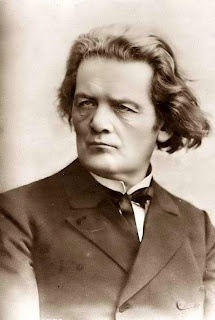Information
Composer: Anton Rubinstein
- Symphony No. 3 in A major, Op. 56: I. Allegro risoluto
- Symphony No. 3 in A major, Op. 56: II. Adagio moderato
- Symphony No. 3 in A major, Op. 56: III. Scherzo. Allegro vivace assai
- Symphony No. 3 in A major, Op. 56: IV. Finale. Allegro maestoso
- Fantasia eroica, Op. 110
Slovak Radio Symphony Orchestra
Robert Stankovsky, conductor
Date: 1993
Label: Naxos
http://www.naxos.com/catalogue/item.asp?item_code=8.223576
-------------------------------------------------------------
The Symphony No. 3 in A major Op. 56 (1855) makes a useful introduction to Anton Rubinstein’s complete set of six. It’s less inflated and rhetorical than its siblings, having a directness to its thematic material that’s immediately appealing. And because No. 3 is abstract in content, and therefore far less reliant on descriptive effect than Rubinstein’s later programmatic symphonies, the orchestration is more conservative–just pairs of woodwinds, four horns, two trumpets, timpani, and strings.
Robert Stankovsky’s 1993 recording was the best installment in his complete Marco Polo cycle, and sonically the same boxy, unresonant quality persists on this Naxos reissue, with tart-sounding woodwinds, piercing brass, and under-weight strings, particularly violins. But Stankovsky’s interpretation is strong and purposeful. The arresting opening motto for strings and its contrasting C-sharp minor response from the winds each suggest a keenness of resolve and a real flair for the music’s character that’s often much less evident in this series. Stankovsky carefully marks the second subject’s arrival, easing the tempo back to give the new idea (exchanged between strings and winds) its head–but underlining the point that it comes from the same fragments heard right at the start of the work by preserving tempo relationships. There also are some nicely prepared moments in the first-movement development, when Rubinstein builds a sequential melody from parts of the first theme, with haunting solos from clarinets and oboes. Sometimes the playing could benefit from more individuality and character (the oboes in particular are rather wooden-toned), but Stankovsky allows his soloists plenty of expressive freedom, again without losing pulse.
The Adagio (strongly suggestive of Tchaikovsky) is let down by the harsh recorded sound. This mainly affects the cello solo second idea, marring an otherwise heartfelt and eloquent reading. The scherzo (in the Mendelssohn mould) tends toward heaviness, with accented bass and cello lines bringing some crudity, with insufficient contrasts of mood and color in the trio. The main ideas return in the finale, but sometimes Rubinstein’s imagination falters and the music gets a little repetitive.
Stankovsky could have induced greater interest through dynamic contrasts, but he rounds off this least successful of the four movements effectively enough, completing a more than acceptable performance.
The filler, Rubinstein’s 1884 “Eroica” Fantasy, is more heavily scored and simply too lacking in melodic interest to make its material stretch to almost half an hour’s worth of music. Rimsky-Korsakov’s description of the piece as “either bad Beethoven or poorly-orchestrated Mendelssohn” might seem harsh, but Stankovsky’s account hasn’t the clearly-focused incisiveness he brings to much of the Third symphony. [3/26/2002]
-- ClassicsToday
More reviews:
http://www.classical-music.com/review/rubinstein-0
http://www.classical.net/music/recs/reviews/n/nxs55590a.php
http://www.amazon.com/Symphony-Eroica-Fantasia-A-Rubinstein/dp/B00005Y0MN
-------------------------------------------------------------

Anton Grigorevich Rubinstein (November 28 [O.S.November 16] 1829 – November 20 [O.S. November 8] 1894) was a Russian pianist, composer and conductor who became a pivotal figure in Russian culture when he founded the Saint Petersburg Conservatory. He was the elder brother of Nikolai Rubinstein who founded the Moscow Conservatory. As a pianist, Rubinstein ranks amongst the great 19th-century keyboard virtuosos. Rubinstein was also a prolific composer throughout much of his life.
http://en.wikipedia.org/wiki/Anton_Rubinstein
http://en.wikipedia.org/wiki/Anton_Rubinstein
***
Robert Stankovsky (August 5, 1964 - January 6, 2001) was a Slovakian conductor. Till January 2001 he was active as the principal conductor of Slovak Radio Symphonic Orchestra as well as a conductor of the Czech Philharmonic Orchestra, the Prague Symphony Orchestra and the Cologne Radio Orchestra.. He had recorded 36 CDs, most of them for Marco Polo and Naxos.
http://www.naxos.com/person/Robert_Stankovsky/31875.htm
http://www.naxos.com/person/Robert_Stankovsky/31875.htm
-------------------------------------------------------------
FLAC, tracks
Links in comment
Enjoy!


This comment has been removed by the author.
ReplyDeleteMEGA
Deletehttp://adf.ly/1ZJLf6
Hi Ronald. This one seems to be temporary unavailable. Would appreciate if you could check. Thanks, and for all your other great uploads.
ReplyDeleteRichard